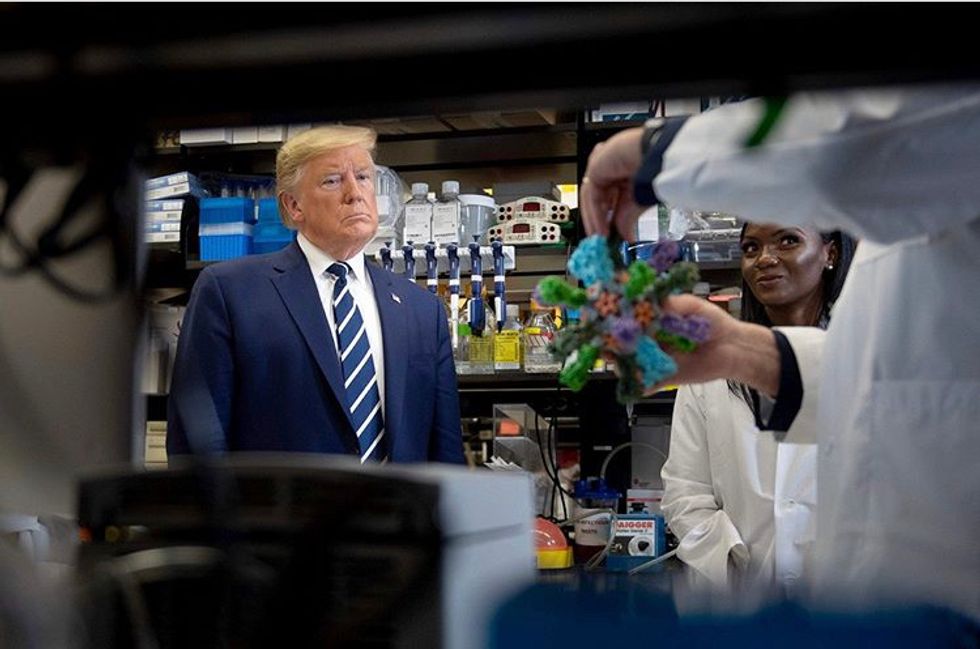How a government handles a disease outbreak, and particularly a potential pandemic, is vital. People are scared; imperishable foods are flying off the shelves, there's a shortage of surgical masks, and, at least around where I live, posters are plastering the walls telling people to wash their hands and who to contact if they think they're sick.
During times like this, people turn to their elected officials, and the experts the government employs, to know what to do.
However, this administration feels much more concerned with saving face than saving lives.
With cases increasing in the United States, the CDC has warned Americans to expect coronavirus to continue to spread. And while CDC officials and other experts have warned of that during White House press conferences, they are being undercut at every turn by Trump administration officials.
On February 7th, for instance, a single day after the World Health Organization revealed that the number of cases worldwide had hit 25,000 (in the month since, that number has risen drastically, to over 90,000), Trump was claiming that containing the virus would be simple since it would die out when the weather warmed up in April.
This statement was widely condemned by experts who reminded the public that it is far too early to speculate on how this disease will behave.
I could maybe write this comment off as some very misplaced optimism. But the administration's continuing response to the outbreak says otherwise.
For one, the president's decision to appoint Mike Pence, a climate-science denier, to run point on the US response is, well . . . not instilling confidence. Pence's biggest claim to public-health-fame was an HIV outbreak in Indiana that he, as governor, hesitated in instituting an appropriate response to, allowing a spread of HIV that, experts opined, could have been curbed had he promptly put needle exchange programs in place. This in no way qualifies him to handle so large of an outbreak. It in no way qualifies him to go anywhere near a leadership role again, really.
Perhaps most blatantly political a move of all, however, was the Trump's attempt to write off valid criticism of its response to the coronavirus as a "hoax" perpetrated by Democrats.
9,000 people across the world have died from a deadly virus and the president is making it political. The president thinks the biggest victim of this outbreak isn't the people suffering the coronavirus, but him, for having to take responsibility for how he addresses it.
But here's the thing; the coronavirus does not care about Donald Trump. It's going to spread whether he feels the Democrats are 'blaming him' or not. And no amount of spin is going to be able to change that.





 people sitting on chair in front of computer
people sitting on chair in front of computer



 all stars lol GIF by Lifetime
all stars lol GIF by Lifetime two women talking while looking at laptop computerPhoto by
two women talking while looking at laptop computerPhoto by  shallow focus photography of two boys doing wacky facesPhoto by
shallow focus photography of two boys doing wacky facesPhoto by  happy birthday balloons with happy birthday textPhoto by
happy birthday balloons with happy birthday textPhoto by  itty-bitty living space." | The Genie shows Aladdin how… | Flickr
itty-bitty living space." | The Genie shows Aladdin how… | Flickr shallow focus photography of dog and catPhoto by
shallow focus photography of dog and catPhoto by  yellow Volkswagen van on roadPhoto by
yellow Volkswagen van on roadPhoto by  orange i have a crush on you neon light signagePhoto by
orange i have a crush on you neon light signagePhoto by  5 Tattoos Artist That Will Make You Want A Tattoo
5 Tattoos Artist That Will Make You Want A Tattoo woman biting pencil while sitting on chair in front of computer during daytimePhoto by
woman biting pencil while sitting on chair in front of computer during daytimePhoto by  a scrabbled wooden block spelling the word prizePhoto by
a scrabbled wooden block spelling the word prizePhoto by 
 StableDiffusion
StableDiffusion
 StableDiffusion
StableDiffusion
 StableDiffusion
StableDiffusion

 women sitting on rock near body of waterPhoto by
women sitting on rock near body of waterPhoto by 
 Photo by
Photo by  Photo by
Photo by  Photo by
Photo by  Photo by
Photo by  Photo by
Photo by  Photo by
Photo by  Photo by
Photo by  Photo by
Photo by  Photo by
Photo by  Photo by
Photo by 








